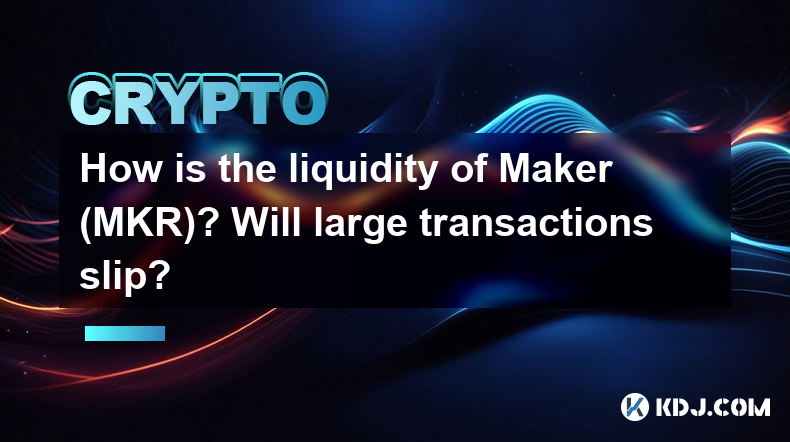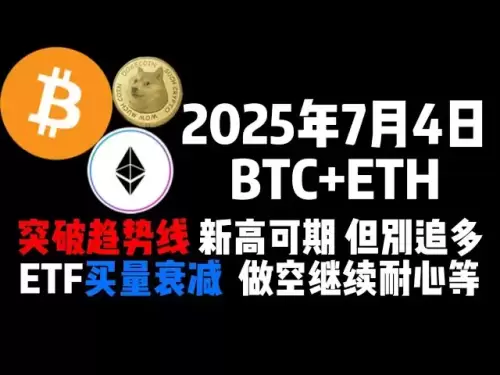-
 Bitcoin
Bitcoin $107,758.1435
-1.45% -
 Ethereum
Ethereum $2,490.6114
-3.32% -
 Tether USDt
Tether USDt $1.0004
0.00% -
 XRP
XRP $2.2042
-2.04% -
 BNB
BNB $651.4818
-1.12% -
 Solana
Solana $145.8782
-3.02% -
 USDC
USDC $0.9999
0.00% -
 TRON
TRON $0.2819
-1.39% -
 Dogecoin
Dogecoin $0.1621
-4.58% -
 Cardano
Cardano $0.5658
-4.18% -
 Hyperliquid
Hyperliquid $37.8181
-6.63% -
 Sui
Sui $2.8404
-4.91% -
 Bitcoin Cash
Bitcoin Cash $481.3703
-2.30% -
 Chainlink
Chainlink $13.0043
-4.79% -
 UNUS SED LEO
UNUS SED LEO $9.0464
0.26% -
 Avalanche
Avalanche $17.6115
-4.39% -
 Stellar
Stellar $0.2359
-2.11% -
 Toncoin
Toncoin $2.7507
-3.93% -
 Shiba Inu
Shiba Inu $0.0...01126
-4.41% -
 Litecoin
Litecoin $86.1256
-3.27% -
 Hedera
Hedera $0.1530
-3.13% -
 Monero
Monero $312.7785
-2.81% -
 Dai
Dai $1.0000
-0.01% -
 Ethena USDe
Ethena USDe $1.0001
-0.02% -
 Polkadot
Polkadot $3.3287
-5.55% -
 Bitget Token
Bitget Token $4.3840
-4.00% -
 Uniswap
Uniswap $6.8370
-10.63% -
 Pepe
Pepe $0.0...09548
-4.25% -
 Aave
Aave $260.2526
-6.11% -
 Pi
Pi $0.4658
-5.45%
How is the liquidity of Maker (MKR)? Will large transactions slip?
MKR has good liquidity on major exchanges like Binance and Coinbase, reducing slippage risk for large transactions due to deep order books and active market makers.
May 01, 2025 at 08:14 pm

How is the liquidity of Maker (MKR)? Will large transactions slip?
Maker (MKR) is a governance token of the MakerDAO platform, which is responsible for managing the DAI stablecoin. Liquidity is a crucial factor for any cryptocurrency, as it affects how easily tokens can be bought or sold without causing significant price changes. In this article, we will explore the liquidity of MKR and discuss whether large transactions are likely to experience slippage.
Understanding Liquidity in the Context of MKR
Liquidity refers to the ease with which an asset can be converted into cash without affecting its market price. For MKR, liquidity is influenced by several factors, including the trading volume on various exchanges, the number of market makers, and the depth of the order book. High liquidity means that large transactions can be executed without causing significant price movements.
Trading Volume and Market Presence
The trading volume of MKR is a key indicator of its liquidity. Higher trading volumes typically indicate better liquidity, as more buyers and sellers are actively participating in the market. MKR is listed on several major cryptocurrency exchanges, such as Binance, Coinbase Pro, and Kraken, which contributes to its overall liquidity. These platforms have a large user base and high trading activity, which helps maintain the liquidity of MKR.
Order Book Depth and Slippage
The depth of the order book is another critical factor affecting MKR's liquidity. A deep order book means that there are many buy and sell orders at various price levels, allowing large transactions to be absorbed without causing significant price changes. To assess the order book depth for MKR, one can visit the trading page on any of the major exchanges where MKR is listed.
For instance, on Binance, you can follow these steps to check the order book depth:
- Log in to your Binance account.
- Navigate to the trading page for MKR.
- Select the MKR trading pair you are interested in (e.g., MKR/BTC or MKR/USDT).
- View the order book, which displays the current buy and sell orders at different price levels.
If the order book shows a significant number of orders at various price points, it indicates good liquidity and a lower likelihood of slippage for large transactions.
Impact of Large Transactions on Slippage
Slippage occurs when there is a difference between the expected price of a trade and the price at which the trade is executed. Large transactions can cause slippage if the order book is not deep enough to absorb the trade without moving the market price. For MKR, the impact of large transactions on slippage depends on the current liquidity conditions.
To minimize slippage when executing large MKR transactions, consider the following strategies:
- Use limit orders: Instead of using market orders, which execute at the best available price, use limit orders to specify the price at which you are willing to buy or sell. This can help control the price at which your transaction is executed.
- Split large orders: Break down a large order into smaller chunks and execute them over time. This can help reduce the impact on the market and minimize slippage.
- Monitor market conditions: Keep an eye on the trading volume and order book depth before executing large transactions. If liquidity is low, it may be better to wait for more favorable conditions.
Market Makers and Their Role in Liquidity
Market makers play a vital role in maintaining the liquidity of MKR. These entities provide liquidity by continuously buying and selling MKR, ensuring that there are always orders in the market. The presence of market makers helps to stabilize the price and reduce the likelihood of slippage for large transactions.
Major exchanges often have partnerships with market makers, who are incentivized to provide liquidity through various mechanisms, such as rebates or fees. The involvement of market makers in the MKR market contributes to its overall liquidity and helps mitigate the impact of large transactions.
Comparing MKR Liquidity to Other Cryptocurrencies
To put the liquidity of MKR into perspective, it is helpful to compare it with other cryptocurrencies. MKR is generally considered to have good liquidity compared to many other altcoins, thanks to its listing on major exchanges and the presence of market makers. However, it may not have the same level of liquidity as more established cryptocurrencies like Bitcoin (BTC) or Ethereum (ETH).
When comparing MKR to other governance tokens or DeFi-related cryptocurrencies, its liquidity is often on par or better. This is due to the significant role that MakerDAO plays in the DeFi ecosystem and the active community surrounding MKR.
Frequently Asked Questions
1. How can I check the current liquidity of MKR on an exchange?
To check the current liquidity of MKR on an exchange, you can follow these steps:
- Log in to your account on the exchange where MKR is listed.
- Navigate to the trading page for MKR.
- Select the MKR trading pair you are interested in (e.g., MKR/BTC or MKR/USDT).
- View the order book to see the current buy and sell orders at different price levels. A deep order book with many orders indicates good liquidity.
2. What are the risks of trading MKR with low liquidity?
Trading MKR with low liquidity can lead to several risks, including:
- Increased slippage: Large transactions may cause significant price movements, resulting in higher slippage.
- Difficulty executing trades: With low liquidity, it may be challenging to find a counterparty willing to buy or sell at your desired price.
- Price volatility: Low liquidity can lead to increased price volatility, making it harder to predict and manage trading outcomes.
3. How does the liquidity of MKR affect its price stability?
The liquidity of MKR directly impacts its price stability. High liquidity helps to absorb large buy or sell orders without causing significant price changes, leading to more stable prices. Conversely, low liquidity can result in increased price volatility, as even small trades can move the market price.
4. Can I improve the liquidity of MKR by becoming a market maker?
Yes, you can contribute to improving the liquidity of MKR by becoming a market maker. Market makers provide liquidity by continuously buying and selling MKR, which helps to stabilize the price and reduce slippage. Many exchanges offer incentives for market makers, such as rebates or reduced fees, which can make it financially rewarding to participate in this role.
Disclaimer:info@kdj.com
The information provided is not trading advice. kdj.com does not assume any responsibility for any investments made based on the information provided in this article. Cryptocurrencies are highly volatile and it is highly recommended that you invest with caution after thorough research!
If you believe that the content used on this website infringes your copyright, please contact us immediately (info@kdj.com) and we will delete it promptly.
- Bitcoin's Pattern Break: Are HODLers the Key to the Next Surge?
- 2025-07-04 18:50:12
- Bitcoin Price, Trump's Bill, and the $150K Dream: A NYC Take
- 2025-07-04 19:50:12
- Ethereum, LILPEPE, and the July Bounce: Will Pepe Steal ETH's Thunder?
- 2025-07-04 19:10:12
- Binance Institutional Loans: Unlocking 4x Leverage and Zero Interest for Whales
- 2025-07-04 19:15:12
- Bitcoin Bull Run: Analysts Eye Peak in Late 2025?
- 2025-07-04 19:20:13
- Pepe Indicators, Bullish Forecast: Can the Meme Coin Rally?
- 2025-07-04 19:25:12
Related knowledge

How to customize USDT TRC20 mining fees? Flexible adjustment tutorial
Jun 13,2025 at 01:42am
Understanding USDT TRC20 Mining FeesMining fees on the TRON (TRC20) network are essential for processing transactions. Unlike Bitcoin or Ethereum, where miners directly validate transactions, TRON uses a delegated proof-of-stake (DPoS) mechanism. However, users still need to pay bandwidth and energy fees, which are collectively referred to as 'mining fe...

USDT TRC20 transaction is stuck? Solution summary
Jun 14,2025 at 11:15pm
Understanding USDT TRC20 TransactionsWhen users mention that a USDT TRC20 transaction is stuck, they typically refer to a situation where the transfer of Tether (USDT) on the TRON blockchain has not been confirmed for an extended period. This issue may arise due to various reasons such as network congestion, insufficient transaction fees, or wallet-rela...

How to cancel USDT TRC20 unconfirmed transactions? Operation guide
Jun 13,2025 at 11:01pm
Understanding USDT TRC20 Unconfirmed TransactionsWhen dealing with USDT TRC20 transactions, it’s crucial to understand what an unconfirmed transaction means. An unconfirmed transaction is one that has been broadcasted to the blockchain network but hasn’t yet been included in a block. This typically occurs due to low transaction fees or network congestio...

How to check USDT TRC20 balance? Introduction to multiple query methods
Jun 21,2025 at 02:42am
Understanding USDT TRC20 and Its ImportanceUSDT (Tether) is one of the most widely used stablecoins in the cryptocurrency market. It exists on multiple blockchain networks, including TRC20, which operates on the Tron (TRX) network. Checking your USDT TRC20 balance accurately is crucial for users who hold or transact with this asset. Whether you're sendi...

What to do if USDT TRC20 transfers are congested? Speed up trading skills
Jun 13,2025 at 09:56am
Understanding USDT TRC20 Transfer CongestionWhen transferring USDT TRC20, users may occasionally experience delays or congestion. This typically occurs due to network overload on the TRON blockchain, which hosts the TRC20 version of Tether. Unlike the ERC20 variant (which runs on Ethereum), TRC20 transactions are generally faster and cheaper, but during...

The relationship between USDT TRC20 and TRON chain: technical background analysis
Jun 12,2025 at 01:28pm
What is USDT TRC20?USDT TRC20 refers to the Tether (USDT) token issued on the TRON blockchain using the TRC-20 standard. Unlike the more commonly known ERC-20 version of USDT (which runs on Ethereum), the TRC-20 variant leverages the TRON network's infrastructure for faster and cheaper transactions. The emergence of this version came as part of Tether’s...

How to customize USDT TRC20 mining fees? Flexible adjustment tutorial
Jun 13,2025 at 01:42am
Understanding USDT TRC20 Mining FeesMining fees on the TRON (TRC20) network are essential for processing transactions. Unlike Bitcoin or Ethereum, where miners directly validate transactions, TRON uses a delegated proof-of-stake (DPoS) mechanism. However, users still need to pay bandwidth and energy fees, which are collectively referred to as 'mining fe...

USDT TRC20 transaction is stuck? Solution summary
Jun 14,2025 at 11:15pm
Understanding USDT TRC20 TransactionsWhen users mention that a USDT TRC20 transaction is stuck, they typically refer to a situation where the transfer of Tether (USDT) on the TRON blockchain has not been confirmed for an extended period. This issue may arise due to various reasons such as network congestion, insufficient transaction fees, or wallet-rela...

How to cancel USDT TRC20 unconfirmed transactions? Operation guide
Jun 13,2025 at 11:01pm
Understanding USDT TRC20 Unconfirmed TransactionsWhen dealing with USDT TRC20 transactions, it’s crucial to understand what an unconfirmed transaction means. An unconfirmed transaction is one that has been broadcasted to the blockchain network but hasn’t yet been included in a block. This typically occurs due to low transaction fees or network congestio...

How to check USDT TRC20 balance? Introduction to multiple query methods
Jun 21,2025 at 02:42am
Understanding USDT TRC20 and Its ImportanceUSDT (Tether) is one of the most widely used stablecoins in the cryptocurrency market. It exists on multiple blockchain networks, including TRC20, which operates on the Tron (TRX) network. Checking your USDT TRC20 balance accurately is crucial for users who hold or transact with this asset. Whether you're sendi...

What to do if USDT TRC20 transfers are congested? Speed up trading skills
Jun 13,2025 at 09:56am
Understanding USDT TRC20 Transfer CongestionWhen transferring USDT TRC20, users may occasionally experience delays or congestion. This typically occurs due to network overload on the TRON blockchain, which hosts the TRC20 version of Tether. Unlike the ERC20 variant (which runs on Ethereum), TRC20 transactions are generally faster and cheaper, but during...

The relationship between USDT TRC20 and TRON chain: technical background analysis
Jun 12,2025 at 01:28pm
What is USDT TRC20?USDT TRC20 refers to the Tether (USDT) token issued on the TRON blockchain using the TRC-20 standard. Unlike the more commonly known ERC-20 version of USDT (which runs on Ethereum), the TRC-20 variant leverages the TRON network's infrastructure for faster and cheaper transactions. The emergence of this version came as part of Tether’s...
See all articles

























































































